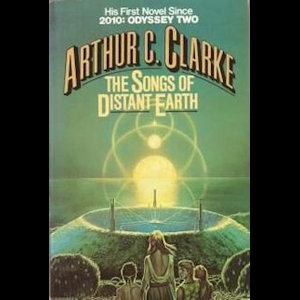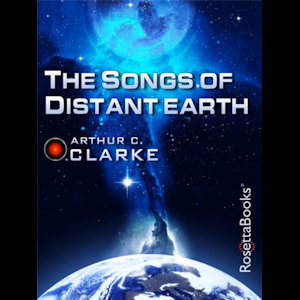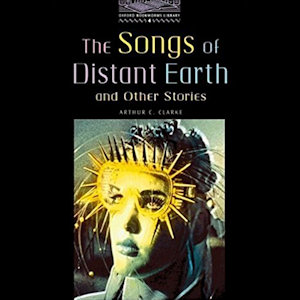The Summer of Arthur C. Clarke: The Songs of Distant Earth
Before I begin, welcome to my Summer of Arthur C. Clarke. On the heels of last year's popular Slasher Summer, this year I'm leaving behind the guilty pleasure of the niche horror genre and exploring something a little closer to my own heart: namely science-fiction. Of all the sci-fi greats, none have influenced me more than the late Arthur C. Clarke, my personal favorite of the "Big Three" from the Golden Age of the genre (Asimov, Clarke, and Heinlein). This summer, I am going to look at a few of his most famous works, including the entirety of his 2001 series and the tiny handful of adaptations that have been made for film, television, and video games. Strap in and prepare yourselves for a journey into the stars and the mind, and let us never forget how much richer the world of fiction is for having been blessed by the incomparable Sir Arthur C. Clarke.
 | | Still riffing on Kubrick's famous celestial alignment shot |
On the distant human colony on the planet Thalassa, life is peaceful, idyllic, and uneventful. However, the tranquility of this small pocket of paradise is quickly tested upon the arrival of the Magellan, an enormous spacecraft that escaped the destruction of Earth and has come to Thalassa as a pitstop along a journey to another system. The two cultures of Thalassa and the Magellan, separated by centuries, must learn to briefly coexist as they share ideas and technologies, but a potential mutiny aboard the orbiting spacecraft and the discovery of intelligent native creatures beneath the surface of the planet's enormous ocean both conspire to make this more than just a friendly visit.
Like many of Clarke's works, The Songs of Distant Earth is more a meditation on ideas than it is a traditional narrative. While it is structured on the arrival and eventual departure of the Magellan to the small islands of Thalassa, it presents problems and obstacles very briefly as it chooses instead to focus on ideas of culture, science, and philosophy. It has a certain poetry to it, but the lack of structure hurts this story more than it does Clarke's other meditations.
Certain plot threads are dropped unceremoniously and never amount to much, most unforgivably the scorps, the intelligent lobster-like creatures that are discovered during the course of events. The scorps are set up to be a huge ethical dilemma--with an entire chapter dedicated to introducing us to the philosophical conundrum they would represent--but the characters all seem to just shrug their shoulders at such implications and carry on as though it's nothing more than a neat discovery.
 | | An interesting interpretation of water being transported to orbit |
The scattershot approach to science-fiction works well for Clarke in Rendezvous with Rama, a story in which the mystery is deliberately and meaningfully open-ended, but here, in The Songs of Distant Earth, it's more frustrating than relevent. It's clear Clarke is overflowing with fascinating ideas, any one of which could be the centerpiece for a much better story, but his inability to whiddle those ideas down to a single narrative makes the entire book feel oddly unnecessary.
In his introductory "Author's Note," Clarke explains that this novel is his rebuttal to the likes of Star Trek and other science-fiction trends in pop culture, that it's his attempt to craft a realistic universe in which mankind is exploring the stars. On that front, it is a success. He very thoughtfully considers the future of technology, science, politics, and human nature, and he definitely does his homework. He considers a plausible scenario whereby humanity is forced to leave Earth (though his pinning it all on the solar neutrino problem has become anachronistic as the problem was solved a couple decades after the book's publication, without scientists discovering that our sun is doomed to go nova in the near future), and though his utopic vision of humanity free from religious influence still feels a bit naïve, he does introduce us to one of his most thoughtful and philosophically nuanced characters in Moses Kaldor, who describes God in terms that are more considerate than judgmental.
Unfortunately, Kaldor is the only character that stands out. This book is stuffed with other characters who could potentially be interesting, including Sirdar Bey, the captain of the Magellan who hides a lovingly wrapped pistol in his safe and itches to use it; Loren Lorenson, the leading man of the tale and a high ranking crewmember who falls in love with a woman from Thalassa; and Kumar Leonidas, a cheerful young Thalassan man whose curiosity eventually gets the better of him. Alas, none of them leap off the page in interesting ways, and they are dragged down by the female lead, Mirissa, a painfully one-dimensional character who reflects every problem Clarke ever has when writing a woman.
 | | I don't know what's going on here, but I dig it |
This is because, despite claiming that society has penetrated sexual barriers and moved beyond traditional gender roles or provincial mores, his universe still feels weirdly paternalistic and old-fashioned when it comes to sex and love. Mirissa, as a character, is defined almost entirely by an awkward love triangle that is given little reason to exist, and her only interesting moments occur when she breaks free from that melodrama and engages with the far more interesting Moses Kaldor. Even then, she is presented as little more than a vehicle against which Moses is free to monologue.
I remember loving The Songs of Distant Earth when I was a young man. Indeed, there are things about this book that are great. Clarke's universe is well-crafted and interesting, and though it isn't fully fleshed out, his vision of the last days of a doomed Earth is incredible. Unfortunately, driven by weak characters and a meandering plot that never really settles on a central problem, the intrigue of that vision makes one wonder why we are spending so much time on the relatively boring planet of Thalassa when there are so many other potential stories to be told.
Next week we'll be wrapping up with Clarke's last solo-written stand-alone novel, The Hammer of God. Clarke's career has a distinct trajectory, despite its ups and downs, and you don't want to miss the exciting conclusion in which a world-ending asteroid is bound for planet Earth in the not-too-distant and all-too-possible future.
-e. magill 8/9/2018
THE UNAPOLOGETIC GEEK'S
SUMMER OF ARTHUR C. CLARKE: | |
|
|
|